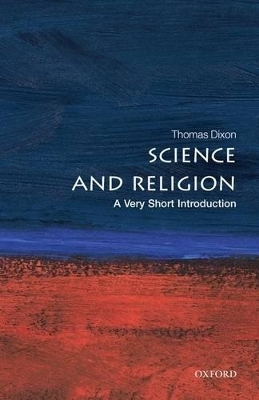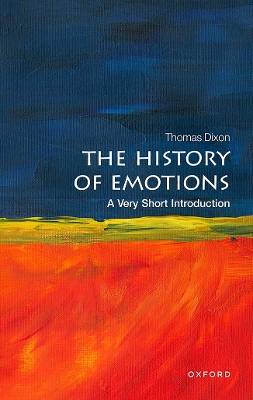Very Short Introductions
3 total works
The debate between science and religion is never out of the news: emotions run high, fuelled by polemical bestsellers like The God Delusion and, at the other end of the spectrum, high-profile campaigns to teach 'Intelligent Design' in schools.
Yet there is much more to the debate than the clash of these extremes. As Thomas Dixon shows in this balanced and thought-provoking introduction, many have seen harmony rather than conflict between faith and science. He explores not only the key philosophical questions that underlie the debate, but also the social, political, and ethical contexts that have made 'science and religion' such a fraught and interesting topic in the modern world, offering perspectives from non-Christian religions and
examples from across the physical, biological, and social sciences.. Along the way, he examines landmark historical episodes such as the trial of Galileo by the Inquisition in 1633, and the famous debate between 'Darwin's bulldog' Thomas Huxley and Bishop Wilberforce in Oxford in 1860. The Scopes
'Monkey Trial' in Tennessee in 1925 and the Dover Area School Board case of 2005 are explained with reference to the interaction between religion, law, and education in modern America.
ABOUT THE SERIES: The Very Short Introductions series from Oxford University Press contains hundreds of titles in almost every subject area. These pocket-sized books are the perfect way to get ahead in a new subject quickly. Our expert authors combine facts, analysis, perspective, new ideas, and enthusiasm to make interesting and challenging topics highly readable.
Yet there is much more to the debate than the clash of these extremes. As Thomas Dixon shows in this balanced and thought-provoking introduction, many have seen harmony rather than conflict between faith and science. He explores not only the key philosophical questions that underlie the debate, but also the social, political, and ethical contexts that have made 'science and religion' such a fraught and interesting topic in the modern world, offering perspectives from non-Christian religions and
examples from across the physical, biological, and social sciences.. Along the way, he examines landmark historical episodes such as the trial of Galileo by the Inquisition in 1633, and the famous debate between 'Darwin's bulldog' Thomas Huxley and Bishop Wilberforce in Oxford in 1860. The Scopes
'Monkey Trial' in Tennessee in 1925 and the Dover Area School Board case of 2005 are explained with reference to the interaction between religion, law, and education in modern America.
ABOUT THE SERIES: The Very Short Introductions series from Oxford University Press contains hundreds of titles in almost every subject area. These pocket-sized books are the perfect way to get ahead in a new subject quickly. Our expert authors combine facts, analysis, perspective, new ideas, and enthusiasm to make interesting and challenging topics highly readable.
Very Short Introductions: Brilliant, Sharp, Inspiring
Emotions are complex mental states that resist reduction. They are visceral reactions but also beliefs about the world. They are spontaneous outbursts but also culturally learned performances. They are intimate and private and yet gain their substance and significance only from interpersonal and social frameworks. And just as our emotions in any given moment display this complex structure, so their history is plural rather than singular. The history of emotions is where the history of ideas
meets the history of the body, and where the history of subjectivity meets social and cultural history.
In this Very Short Introduction, Thomas Dixon traces the historical ancestries of feelings ranging from sorrow, melancholy, rage, and terror to cheerfulness, enthusiasm, sympathy, and love. The picture that emerges is a complex one, showing how the states we group together today as "the emotions" are the product of long and varied historical changes in language, culture, beliefs, and ways of life. The grief-stricken rage of Achilles in the Iliad, the happiness inscribed in
America's Declaration of Independence, the love of humanity that fired crusades and revolutions through the ages, and the righteous rage of modern protest movements all look different when seen through this lens.
With examples from ancient, medieval, and modern cultures, including forgotten feelings and the creation of modern emotional regimes, this Very Short Introduction sheds new light on our emotions in the present, by looking at what historians can tell us about their past. Dixon explains the key ideas of historians of emotions as they have developed in conversation with psychology and psychiatry, with attention paid especially to ideas about basic emotions, psychological construction, and
affect theory.
ABOUT THE SERIES: The Very Short Introductions series from Oxford University Press contains hundreds of titles in almost every subject area. These pocket-sized books are the perfect way to get ahead in a new subject quickly. Our expert authors combine facts, analysis, perspective, new ideas, and enthusiasm to make interesting and challenging topics highly readable.
Emotions are complex mental states that resist reduction. They are visceral reactions but also beliefs about the world. They are spontaneous outbursts but also culturally learned performances. They are intimate and private and yet gain their substance and significance only from interpersonal and social frameworks. And just as our emotions in any given moment display this complex structure, so their history is plural rather than singular. The history of emotions is where the history of ideas
meets the history of the body, and where the history of subjectivity meets social and cultural history.
In this Very Short Introduction, Thomas Dixon traces the historical ancestries of feelings ranging from sorrow, melancholy, rage, and terror to cheerfulness, enthusiasm, sympathy, and love. The picture that emerges is a complex one, showing how the states we group together today as "the emotions" are the product of long and varied historical changes in language, culture, beliefs, and ways of life. The grief-stricken rage of Achilles in the Iliad, the happiness inscribed in
America's Declaration of Independence, the love of humanity that fired crusades and revolutions through the ages, and the righteous rage of modern protest movements all look different when seen through this lens.
With examples from ancient, medieval, and modern cultures, including forgotten feelings and the creation of modern emotional regimes, this Very Short Introduction sheds new light on our emotions in the present, by looking at what historians can tell us about their past. Dixon explains the key ideas of historians of emotions as they have developed in conversation with psychology and psychiatry, with attention paid especially to ideas about basic emotions, psychological construction, and
affect theory.
ABOUT THE SERIES: The Very Short Introductions series from Oxford University Press contains hundreds of titles in almost every subject area. These pocket-sized books are the perfect way to get ahead in a new subject quickly. Our expert authors combine facts, analysis, perspective, new ideas, and enthusiasm to make interesting and challenging topics highly readable.


